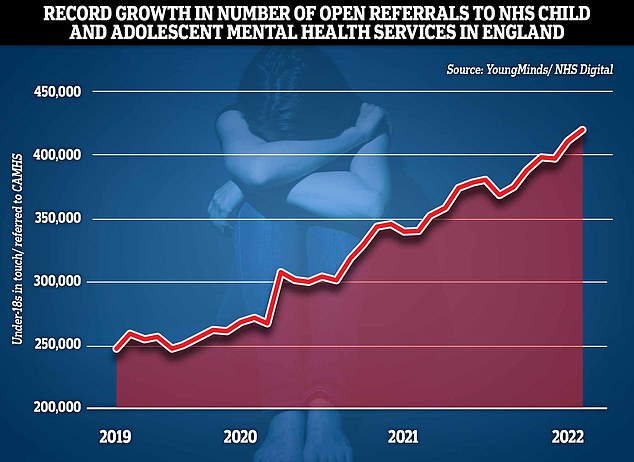Tell-tale signs your child is struggling with their mental health… and what psychologists say you need to do next
More children than ever before are struggling with their mental health.
But it can be difficult for parents to recognize this when a child is struggling with depression or anxiety and knows what to do about it.
Young people today are facing a “unique set of pressures”, including surviving the Covid pandemic, the cost of living crisis and “global instability”, says Stevie Goulding, senior manager for parents and carers at the charity YoungMinds.
James Emmett, regional clinical lead at young people’s mental health charity Place2Be, warns that Britain is seeing ‘a sharp increase in diagnosable mental health problems among children and young people’.
One in six children in Britain now suffer from poor mental health, equivalent to five in every class, according to charities, up from one in nine before Covid.
Here, Ms Goulding and Mr Emmett talk about how parents can find out if their child is struggling and how to help.

More children than ever before are struggling with their mental health. But it can be difficult for parents to tell when a child is suffering from depression or anxiety and know what to do about it

Since the Covid pandemic, there has been record growth in the number of children and young people listed with an ‘open referral’ at the NHS Child and Adolescent Mental Health Services in England.
Look for behavioral changes
A change in behavior is usually the first sign that a child or young person is feeling down, Mr Emmett says.
“They may eat too much or too little, have trouble sleeping, or stop doing things they normally enjoy,” he says.
Mrs Goulding adds: ‘If you notice changes in your child’s behavior or if your child seems persistently upset, this could mean he is struggling with his mental health, and it is important to take his concerns seriously.’
Give them a chance to talk
Ms. Goulding advises parents to talk to their child or teen about how they are feeling in a non-judgmental way.
“Remember, they may not want to open the door at first. Reassure them that you are there for them if they want to talk,” she says.
“Remind them that it’s okay for them to feel scared or insecure, and try to reassure them.”
Don’t force them to talk
While it is crucial to give children the opportunity to share their concerns, not all children will want to talk.
Mr Emmett says: ‘It’s important that adults don’t force them into a conversation they don’t want to have.
‘Parents and carers should make sure they are available but don’t pressure them to talk.
‘It can be very tempting to ask a lot of questions.
“But it’s easy to fall into interrogation mode. Try to focus on the here and now and what could help you move forward.”
Choose your moment
Avoid discussing the underlying causes of your child’s distress during intense moments, Ms. Goulding advises.
She says: ‘While it is crucial to provide support, it can be more helpful to address these topics when they are feeling calmer.’
Ask how they feel
Ask your child to notice when he is feeling more or less sad, for example at school, or when he is with his friends and family, Mr. Emmett suggests.
“Responding to your child’s cues with care and interest teaches you that you are there for him,” he notes.
Ms Goulding says parents can acknowledge their child’s feelings by saying something like: ‘It’s completely understandable that you feel…’.
She explains, “This helps reassure them that their feelings are valid and that it’s okay to feel different emotions.”
Remind them of obstacles they have overcome in the past
When a child or young person becomes overwhelmed, they forget how much they have already been through in their lives.
“Tell them stories about how proud you were when they were going through certain moments in their lives, like taking an exam or moving,” says Mr. Emmett.
‘This will remind them of their resilience – their ability to adapt to difficult situations.’
Encourage them to stay active
Physical and mental well-being are often linked.
‘This means that doing something active can be a great way to improve your child’s mental health, and getting outside in green spaces can have even greater benefits,’ says Mr Emmett.
He suggests that parents walk or cycle short distances with their child instead of driving: ‘It’s cheaper and it will also make the planet healthier.’
Model positive relationships
Happy relationships between parents and significant adults lead to better mental and physical health for everyone, Mr Emmett points out.
“By modeling positive relationships yourself, you can help your child see what positive, healthy, and meaningful relationships should look like—and recognize when friendships aren’t positive,” he says.
Remind them how they think it will change
Your child may not be able to see the light at the end of the dark tunnel they find themselves in.
“Reassure your child that how he feels is temporary,” says Ms. Goulding.
“Things can change and they can feel better.”
Discuss what help is available
Talk to your child about the different resources available.
These include helplines, text lines and online chat services.
“Reassure them that it is okay to confide in others, as young people often worry about upsetting their parents,” says Ms Goulding.
In addition to YoungMinds’ parent helpline (0808 802 5544) and Place2Be, other resources include a child’s school, which will provide mental health guidance to seniors.
In addition, GPs can refer your child to child and adolescent mental health services, while Parenting Smart provides free advice to parents and carers of 4-11 year olds on how to support their child’s wellbeing and behaviour.
There is also the free Shout 24/7 text line for anyone in crisis (text SHOUT to 85258).
